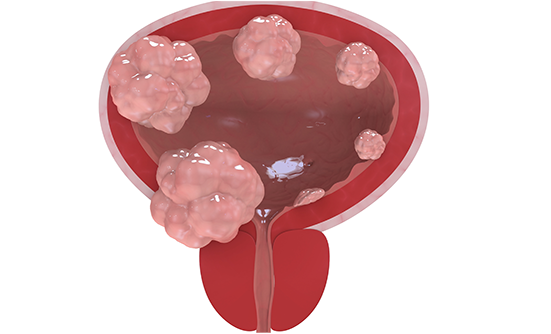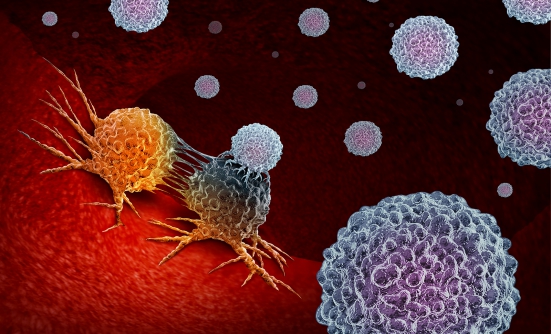Bladder cancer is the fourth most common cancer in men, and is less common in women. According to the American Cancer Society, about 79,030 new cases of bladder cancer will be diagnosed in 2017. Urothelial carcinoma is the most common type of bladder cancer. Urothelial carcinomas start in the urothelial cells that line the inside of the bladder. Other, less common types of bladder cancers include squamous-cell carcinoma, adenocarcinoma, small-cell carcinoma, and sarcoma.
Bladder cancer can often be found early, because some of its symptoms are obvious, such as blood in the urine; as in all cancers, the earlier bladder cancer is detected, the earlier treatment can begin, and the greater likelihood for survival.
Until recently, treatment options for bladder cancer included surgery, chemotherapy, radiation therapy, and Bacillus Calmette-Guérin (BCG), which is an older type of immunotherapy that is made of a bacteria that can help stimulate the immune system. Before the FDA approval of new immunotherapy drugs, BCG was the main treatment used for bladder cancer.
The past year, from May 2016 to May 2017, was a watershed period for new immunotherapy treatments for bladder cancer. After decades of no new treatments approved by the FDA for this type of cancer, 5 new immunotherapies were approved in a span of 12 months for bladder cancer.
A Watershed Year of New Immunotherapies for Bladder Cancer
The first PD-L1 immunotherapy drug was approved by the FDA in May 2016, and in the first part of 2017, 4 more immunotherapy drugs—3 anti-PD-L1 checkpoint inhibitors and 1 anti-PD-1 checkpoint inhibitor—were approved by the FDA for the treatment of patients with bladder cancer who had received previous therapy for bladder cancer.
These checkpoint inhibitors are intended for use in patients with locally advanced or metastatic bladder cancer (urothelial carcinoma) that progressed during or after treatment with platinum-containing chemotherapy, or within 12 months of receiving platinum-containing chemotherapy, either before (neoadjuvant) or after (adjuvant) surgical treatment.
Tecentriq
On May 18, 2016, the FDA approved the first immunotherapy drug, Tecentriq (atezolizumab), and the first anti-PD-L1 checkpoint inhibitor to be approved for the treatment of patients with urothelial carcinoma. Tecentriq was the first new drug in several decades to be approved by the FDA for this type of cancer, the most common type of bladder cancer. This anti-PD-L1 immunotherapy drug specifically targets the PD-L1 protein that is expressed on cancer cells and provides protection for the cancer cells. By targeting this protein, Tecentriq attacks the cancer cells with the goal of shrinking or killing the tumor.
Tecentriq was approved for the treatment of patients who had received previous therapy for bladder cancer. The FDA approval was based on a study showing that about 15% of patients who used this immunotherapy had a reduction in their tumor. However, among patients who had high expression of the PD-L1 protein, a greater proportion of patients (26%) had their tumor shrink after treatment with Tecentriq. In addition, the period of time the tumor did not grow was also longer in patients with high PD-L1 expression. However, Tecentriq can be used (after other therapies in most patients) by all patients with urothelial cancer, even those without PD-L1 expression.
“Tecentriq provides these patients with a new therapy targeting the PD-L1 pathway,” said Richard Pazdur, MD, Director of the FDA’s Oncology Center of Excellence, in a statement after the FDA approval of Tecentriq in May 2016. “Products that block PD-1/PD-L1 interactions are part of an evolving story about the relationship between the body’s immune system and its interaction with cancer cells,” Dr. Pazdur added.
Opdivo
The second anti-PD-L1 checkpoint inhibitor, Opdivo (nivolumab), was approved by the FDA for patients with bladder cancer on February 2, 2017, based on a study showing that in almost 20% of patients who received Opdivo, the bladder cancer was shrinking, and this response to Opdivo treatment lasted for about 10.3 months.
Opdivo was initially approved for melanoma, and then for several other types of cancer (including lung cancer, head and neck cancer, kidney cancer, and Hodgkin lymphoma).
Imfinzi
The third anti-PD-L1 checkpoint inhibitor, Imfinzi (durvalumab), received FDA approval for bladder cancer on May 1, 2017. The approval of Imfinzi was based on a study that showed that among all patients with bladder cancer who received Imfinzi, 17% of the patients had tumor shrinkage, regardless of whether their tumor expressed the PD-L1 protein. However, the results were even better for patients whose tumor had high levels of PD-L1 expression: about 26% of patients with high PD-L1 levels had their tumor shrink. This was the first-ever FDA approval for Imfinzi.
Bavencio
On May 9, 2017, yet another anti-PD-L1 checkpoint inhibitor, Bavencio (avelumab), was approved by the FDA for patients with bladder cancer. In the study that led to its approval, Bavencio shrunk tumors in about 13% of patients during a period of at least 13 weeks, and in 16% of patients during a period of at least 6 months.
“Once urothelial carcinoma progresses after treatment with chemotherapy, the five-year survival rate is alarmingly low,” said Andrea Apolo, MD, of the National Cancer Institute, in a statement after the approval. “Until recently, there had been limited innovation in urothelial carcinoma, and this approval [of Bavencio] gives us another treatment to help battle this aggressive disease,” Dr. Apolo said.
Bevencio was initially approved by the FDA in March 2017 for the treatment of patients with a rare cancer, Merkel-cell carcinoma.
Keytruda
Finally, the anti-PD-1 checkpoint inhibitor Keytruda (pembrolizumab) was approved by the FDA for bladder cancer on May 18, 2017. Keytruda was approved for this type of cancer based on study results showing that this immunotherapy drug reduced the risk for death from bladder cancer by 27% compared with chemotherapy in patients who had previously received treatment for their cancer. In addition, patients who received Keytruda survived longer than patients who received chemotherapy.
Like Opdivo, Keytruda has been approved for many types of cancer before being approved for bladder cancer.
Initial Treatment for Some Patients with Bladder Cancer
In 2017, the FDA also approved the use of Tecentriq and Keytruda as the first treatment for patients with locally advanced or metastatic bladder cancer (urothelial carcinoma) who cannot use cisplatin-based chemotherapy.
Tecentriq was approved for this subgroup of patients on April 18, 2017. The clinical trial that led to this approval included up to 50% of patients with advanced bladder cancer who were not eligible to use cisplatin chemotherapy as the initial treatment. Of all the patients in this study, 28% patients had their bladder tumor shrink after receiving Tecentriq as the first treatment.
“Tecentriq provides these patients with a new therapy targeting the PD-L1 pathway. Products that block PD-1/PD-L1 interactions are part of an evolving story about the relationship between the body’s immune system and its interaction with cancer cells.” — Richard Pazdur, MD
A month later, on May 18, 2017, the FDA approved Keytruda as the use as first treatment in patients who were not able to use cisplatin-based chemotherapy. In the clinical trial that led to this approval, 28.6% of patients with newly diagnosed bladder cancer had their tumor shrink after receiving Keytruda. As noted earlier, on the same day, Keytruda was also approved for use in patients with bladder cancer who had already received another treatment.
The Future
The recent FDA approval of several immunotherapy drugs for bladder cancer has transformed the treatment of this cancer by improving outcomes for patients and reducing the risk for bladder cancer recurrence (returning), according to the Cancer Research Institute.
In addition, these new treatment options have resulted in more patients who have a complete response to treatment and no longer have a sign of cancer.
New immunotherapies that are currently being investigated in clinical trials, and the potential for combination immunotherapies in the future, may help to improve the outcomes for patients with bladder cancer, extend lives, and potentially find a cure for this common type of cancer.
Key Points
- Bladder cancer is the fourth most common cancer in men, and urothelial carcinoma is the most common type of bladder cancer
- After decades of no new treatments approved by the FDA for urothelial carcinoma, 5 new immunotherapies were approved in a span of 12 months for bladder cancer
- Until recently, treatment options for bladder cancer included surgery, chemotherapy, radiation therapy, and BCG, which is an older type of immunotherapy
- Before the FDA approval of new immunotherapy drugs, BCG was the main treatment for bladder cancer
- The 5 immunotherapy drugs approved by the FDA for bladder cancer include Tecentriq, Opdivo, Imfinzi, Bavencio, and Keytruda
- New immunotherapies are being investigated in clinical trials, which may help to improve survival for patients with bladder cancer
Patient Resources
American Cancer Society
www.cancer.org/cancer/bladder-cancer/treating/immunotherapy-for-bladder-cancer.html
Cancer Research Institute
www.cancerresearch.org/we-are-cri/home/what-is-immunotherapy
National Cancer Institute
www.cancer.gov/news-events/cancer-currents-blog/2017/approvals-fda-checkpoint-bladder















